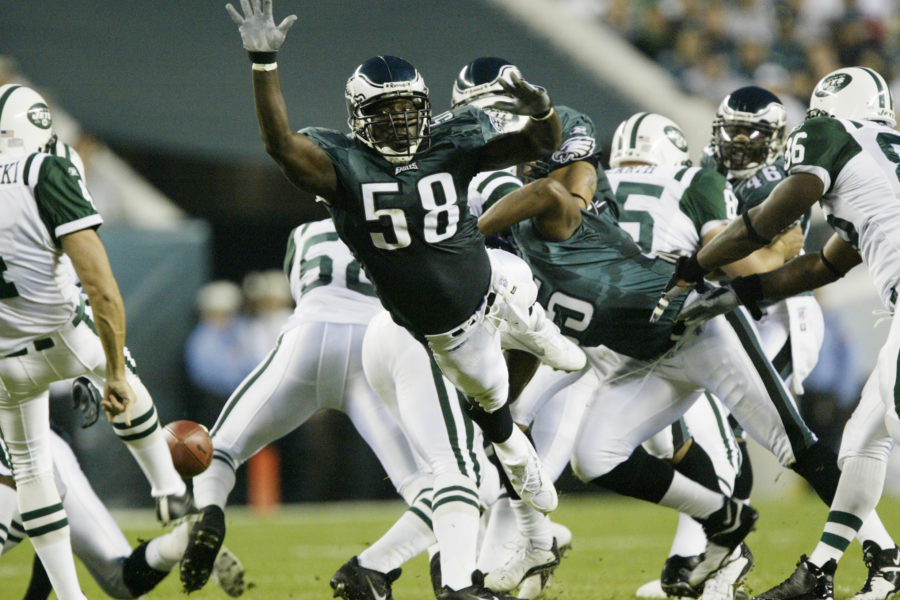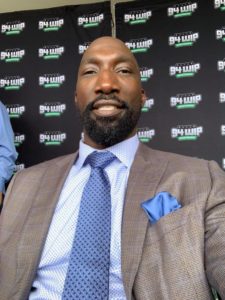
26 October 2003: The Philadelphia Eagles defeated the New York Jets 24-17 at Lincoln Financial Field in Philadelphia, PA. Mandatory Credit: Drew Hallowell
Over the years former professional athletes have come and gone on local sports talk radio shows. Ike Reese came and stayed.

Ike Reese
Reese arrived in Philadelphia as part of a really good 1998 Eagles draft that also featured left tackle Tra Thomas, middle linebacker Jeremiah Trotter, return man Allen Rossum, and defensive lineman Brandon Whiting. Now some 22 years later Reese, a Pro Bowl special teams player, hosts the No. 1 drive time sports talk radio show on 94 WIP with co-host Jon Marks.
Ask most sports talk listeners who their favorite or most popular media personality is today, and the answer will be “Ike”.
“There are former football players on the radio, and then there are radio hosts who used to play football,” WIP Program Director Spike Eskin said. “Ike is the latter. He’s become such a great host, teammate, and someone who people in Philadelphia genuinely love. He’s put himself in position to become one of the all-time greats at 94WIP, and he’s just starting.”

Reese started at WIP as a part-time fill-in host and went full-time in 2008, two years after his two-year hiatus from Philadelphia as a member of the Atlanta Falcons ended. His show, which he dubbed “Ike at Night”, earned him a promotion to share the drive time slot with Howard Eskin (Spike’s father) in 2009. That led to the midday show, “Mike and Ike”, which he co-hosted with Michael Barkann from 2012-16 and finally to the drive time slot in 2017.
“Aw, heck, no,” Reese said with his well-heard laugh when asked if he saw himself still being here 22 years after the Eagles drafted him. “I was just hoping I made the team in 1998. I never envisioned being here 20-plus years later.”
Eagles players, or former Eagles players, just as their hockey counterparts the Flyers do, seem to make Philadelphia, or South Jersey, home after their careers end. Reese could have opted to return home to Cincinnati, could have returned to Michigan where he was a star at Michigan State, or even stayed in Atlanta. As someone once said, “On the whole, he would rather be in Philadelphia.”
“Atlanta was a very good city, great metro area. My wife wouldn’t have minded staying there,” Reese said. “But by then, at that point of my life, I already knew this is where I was going to be in my post-NFL career no matter what I did. I had already started the groundwork on what I wanted to do after football and it was going to be here.”
And what makes Philadelphia so attractive to former athletes is what has also made Reese so attractive to the sports radio crowd.
“First of all it’s a great area to live for those of us who aren’t from here,” Reese said. “Living in this area you’re surrounded by so much. Whatever your flavor is, you have New York, you have A.C., you have D.C., Baltimore, you got whatever you want as far as I’m concerned. And as it pertains to the athletes who stick around here a lot of it is about the relationships you developed while you played here. With this city being as entrenched in professional sports as it is, we come here and find out what’s it like. It’s addictive. For an athlete what better place to be than where you played? If you connected with this fan base, you’ll be treated like a hero for the rest of your life. Players feel that gratification from the fan base for years, and probably more so after your career. That adulation, adoration is something we like, especially after your career is over. It can still be exhilarating for you.”
Reese was as popular as a backup linebacker/special teams ace could be as a player. He always had a good rapport with the media, whether it was the daily beat writers who he engaged in sports talk in the back corner of the NovaCare Complex locker room where his stall was, or the radio and television guys who came around every so often.
“I identified with the city,” Reese said. “Fans have to know the players care, because they care so much. They have to know that when we don’t meet expectations and they’re hurting for weeks and months and years, they have to know that you as an athlete care too. You have to care that it bothers them.”
While some players swear they don’t read what is written about them, or listen to, or watch, what is said, Reese not only read, listened and watched, he practiced for what would be his future.
“I loved it,” he said of his sports debates with writers and teammates in the locker room. “I always knew I wanted to get into some form of broadcasting when I finished playing. Probably initially I thought it might be from a TV standpoint as a studio analyst or something. But when I started to understand what sports talk radio was about from a fan and listener to the host I thought that really fit my personality more than anything. I’ve been arguing who’s the best at this or who’s the best at that since I was a kid with my brothers. That carried on through my college days, debating with teammates things like (Michael) Jordan vs. Magic [Johnson] back then. Even onto the pro ranks, there were some of us who were sports fans and followed other sports. Those debates would be in the lunchroom, the locker room, the training room, that was just natural for me.”
Reese lived in deep South Jersey during his playing days so his drive to work wasn’t as short, or easy, as it was for most of his teammates. To kill time in the car, he tuned into what was then 610 WIP.
“I would listen to Angelo [Cataldi] on the way to work around 6:30,” Reese said. “And he would tick me off because he would be ripping the Eagles, or Andy [Reid], for something. But other days he just amused me. On the way home, around 5 or 6, I would listen to Howard and he would be ripping Allen [Iverson]. I’m stuck in traffic on [Route] 42 and I’m thinking to myself this is crazy. I became such a fan I stopped listening to music.”
Now it’s Reese who fans and players, although they likely wouldn’t admit it, tune into on their drive home. You don’t get to be No. 1 in the market without a lot of listeners. The ratings have become Reese’s new scoreboard and he’s winning a lot more than he’s losing.
“It’s huge,” he said of being No. 1. “In this business, which I’ve come to learn, it’s about ratings. The bosses are happy when you’re at the top and not so happy when you’re in the middle of the pack or lower.”
What’s helped Reese go from backup player to top radio host is the homework—he already knew sports—to learn the Philadelphia sports team’s history, and also the passion of the Philadelphia sports fans. The Eagles he knew. He had to learn about Joe Carter and Mitch Williams; the Flyers goaltending issues over the years; and all those bad Sixers years.
“What was most crucial for me was listening to the station all the time, all day, before I would go on the air,” he said. “That helped me learn the history whether it be from the host or the callers. I soaked it all in. In Philly, you can’t be fake, you can’t be phony, you can’t be a fraud. Fans will read right through that and you’ll lose all credibility.”
Reese had instant credibility as a player so much so that both Reid, with Kansas City and John Harbaugh, with Baltimore, wanted him on their coaching staffs. It wasn’t an easy decision, but he decided to stay with the radio headphones over the coaching ones.
“I thought about it for sure,” he said. “It wasn’t easy saying no to those guys. I would normally do anything they asked me to do. I followed my heart. There were times I wondered if I made the right decision. But I made it through those times and I know now I made the right choice. I can’t see myself doing anything else.
“I’ve had two dream jobs and I don’t feel like I’ve worked a day in my life.”

